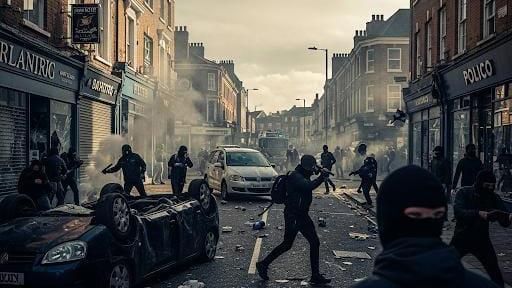Britain is on high alert, bracing for potential widespread social unrest as details of a clandestine Afghan resettlement scheme, previously hidden by an unprecedented super-injunction, come to light. The lifting of this injunction on Tuesday has ignited public fury and re-energized existing tensions, pushing ministers to urgently prevent a recurrence of last summer's violent anti-immigration protests.
The controversy stems from a catastrophic data breach under the previous Conservative government, which exposed the personal information of thousands of Afghans who had assisted UK forces under the Afghan Relocations and Assistance Policy (ARAP). This scheme was designed to offer refuge in the UK to those who supported British military operations during the 20-year conflict in Afghanistan. Between 80,000 and 100,000 individuals, including their families, were affected. In June 2024, judges warned of severe risks, including harassment, torture, or death, if this sensitive data fell into Taliban hands.
Escalating Figures and Mounting Costs
As of July 15, 2025, approximately 4,500 people (comprising 900 ARAP applicants and 3,600 family members) have either been relocated to the UK or are in transit via the Afghanistan Response Route (ARR). This scheme was specifically established in April 2024 in response to the data breach. The ARAP scheme stopped accepting new applications on July 1, 2025, though applications received before this date will still be processed. The Afghan Citizens Resettlement Scheme (ACRS) has also concluded, having resettled over 12,800 people since 2021, falling short of its original target of 20,000.
The ARR scheme, responsible for bringing in these 4,500 individuals, has already incurred costs of around £400 million, with a projected total of approximately £850 million upon completion. While the Ministry of Defence (MoD) initially estimated £800 million for 6,900 individuals impacted by the data breach, court documents suggest the overall cost for all Afghan relocations could skyrocket to an astonishing £7 billion, much of which has bypassed parliamentary oversight. Furthermore, several million pounds are anticipated in legal fees and compensation related to the super-injunction and the data breach itself.
Lack of Accountability Amidst "Serious Departmental Error"
Despite the gravity of the breach, which the Information Commissioner's Office (ICO) described as "deeply regrettable" and a "potential threat to life," LBC understands that no one has been held accountable or dismissed over the incident. An internal investigation was conducted, and the matter was reported to both the Metropolitan Police and the Information Commissioner. MoD officials, in private hearings, attributed delays in addressing the breach to "a lack of ministerial decisions," with evidence suggesting political considerations, such as pressure to reduce asylum hotel usage, may have influenced who received assistance.
The Super-Injunction's Unveiling and Public Reaction Warnings
The unprecedented super-injunction, which previously prevented news outlets from reporting on the story, was finally lifted on Tuesday by a ruling from Mr. Justice Chamberlain. He had previously cautioned that the secrecy had effectively placed British democracy "into cold storage." A Whitehall briefing note, circulated on July 4 and seen by The Telegraph, explicitly warned government departments of a potentially violent public backlash, urging the MoD to "work with colleagues across Government... to mitigate any risk of public disorder."
Holiday Season Heightens Riot Risks
The impending holiday season, combined with the exposed government secrecy and existing societal pressures, creates a volatile environment ripe for potential unrest. Several factors contribute to this heightened risk. Immigration concerns remain a dominant public issue in the UK, with a YouGov poll in early 2025 showing that 46% of Britons consider it the most important issue. The perceived lack of transparency surrounding the Afghan resettlement scheme, particularly its cost and scale, is likely to intensify these anxieties.
Adding to the discontent are economic pessimism and the cost of living crisis, with frustration over slow economic growth, rising industrial energy costs, and general financial strain. A new report highlights a "powder keg" of tensions, fueled by widespread concerns about declining public services, inequality, and a pervasive lack of trust in politicians and institutions. The government's use of a super-injunction is expected to have further eroded public confidence. Furthermore, social media amplification continues to be a significant factor in organizing and escalating protests, as evidenced by past instances of disorder. The persistent influence of far-right groups, which actively encouraged last summer's anti-immigration protests, is likely to exploit the current climate to incite further unrest.
Who Is Most At Risk?
While no single group orchestrates widespread riots, last summer's anti-immigration protests underscore the influence of far-right organizations. These groups leverage social media platforms like WhatsApp, Telegram, and Facebook to organize gatherings and spread information, often capitalizing on existing grievances and misinformation. Areas with lower levels of social cohesion, particularly around Manchester, Leeds, and Newcastle, and towns like Boston, have been identified as potentially more vulnerable to disorder. These areas frequently experience heightened tensions between long-term residents and newly arrived communities. Cities with significant existing anti-immigration sentiment and a history of related protests are also at higher risk.
The primary victims of any widespread unrest would be the communities themselves, especially those perceived as "outsiders" or new arrivals. This includes newly arrived Afghan refugees and asylum seekers, who face a direct risk of targeted harassment and violence. Visible minority communities are also at risk, as previous riots saw attacks on mosques and hotels housing asylum seekers, indicating a broader targeting of those perceived as "different." Local businesses and economies also stand to suffer, with high streets and community spaces having endured damage or destruction in last year's protests. Emergency services will be stretched thin and personnel will be at risk of injury. Individuals with limited English proficiency or those reliant on public services may face increased vulnerability and difficulty accessing support during times of disorder.
Community Anxieties Across Britain
Various British ethnic and religious communities are experiencing heightened anxieties. British Bangladeshi, British Pakistani, British South Asian, and British Muslim communities often find themselves at the forefront of anti-immigrant sentiment. They are particularly concerned about targeted attacks, hate crimes, and discrimination. The historical context of racial tensions and previous attacks on these communities (for example, in Tower Hamlets against Bangladeshis) adds to their apprehension. Concerns about misinformation spreading rapidly on social media, often targeting these groups, are also prevalent.
The British African community shares similar concerns regarding racial profiling, discrimination, and the potential for increased hate incidents. Efforts to address health disparities within Black communities also highlight existing inequalities that can be exacerbated during times of social unrest. While not directly targeted in the same way as some other groups in recent anti-immigration protests, British Indian and British Hindu communities share broader concerns about social cohesion, political polarization, and the potential for generalized unrest. There are also ongoing discussions around the definition of anti-Muslim hatred and the need for comprehensive protection against all religious hate, including anti-Hindu hate.
Lessons from Last Summer: Communities Most Affected
The violent anti-immigration protests of last summer, partly triggered by misinformation following the murders of three girls in Southport, witnessed widespread targeting of visible minorities and people seeking asylum. These attacks were described as "the UK's worst targeted violence in a generation." Reports indicated significant divisions between people born in the UK and migrants, refugees, and asylum-seekers, as well as tensions between different faiths and ethnic groups. Areas with hotels housing asylum seekers were specifically targeted.
Indeed, the British Bangladeshi community and newly arrived immigrants, including Afghans, face a significant and elevated risk. The British Bangladeshi community, with its history of facing racial violence and discrimination in the UK, is particularly vulnerable. The current climate, fueled by anti-immigration sentiment and the revelation of a secret resettlement scheme, creates a direct threat. Newly arrived immigrants, especially those seeking asylum, are often the direct target of protests and hate-fueled rhetoric, making their safety paramount. Both groups may face increased incidents of hate crime, harassment, and discrimination, impacting their sense of security and belonging in the UK.
The government's immediate challenge is not only to mitigate potential public disorder but also to rebuild trust and address the underlying causes of division that threaten the very fabric of British society.








.svg)
